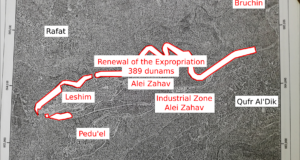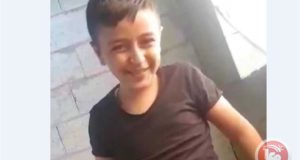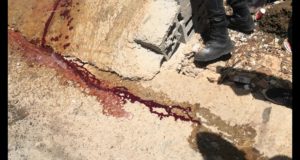By: Eva Bartlett
Mohammed, a youth of 16 from Azzoun village near the West Bank city of Qalqilya, has returned from his week-long stay in the hospital. He can move around more than one would expect for someone who was just 8 days ago shot by the Israeli army during one of its regular invasions into Azzoun. The bullet entered his left side just two inches from his heart, passed through his lung and, penetrating his diaphragm, passed on just one inch from his spinal cord into his spleen where it lodged. The hospital report records all of this, adding that there resulted a dangerous amount of internal bleeding and jaundice. His spleen was surgically removed and he was attached to machine which pumped out blood from the internal bleeding.
At the time of his injury, he was outside the home of his grandmother, in the streets of the village’s old city quarter. It was after 3 pm, young boys and teens had just gotten out of school for the day, the streets filled with their raucous talk and play. Mohammed walked for about 100 metres then fell unconscious. The bullet which entered his chest had gone unnoticed at first, but its effects were thereafter very noticeable.
There are claims that boys were throwing stones from the area where Mohammed was targeted. He, reporting that he was unaware of their presence in town and on rooftops, had not been involved, was dragged into the fray only in the sense that he paid the price for the accusations. Never mind that it is illegal under international and Israeli law to shoot live ammunition at boys armed with stones. Even the permitted rubber bullets, metal balls coated with a thin sheath of rubber, are already a breach of comprehension: upon impact, the metal inside often comes free of its candy-wrapper shell, inflicting serious enough damage. An M-16 bullet –pointed and deadly –has no place in civilian areas against youths, certainly not against bystanders.
After his spleen was surgically removed, Mohammed spent until December 4th in the Qalqilya hospital. Back home, he now has regular visits from the doctor –for check-ups and to change the dressing of his bullet hole wound, which is still open and needing to heal cleanly. He will not attend school for at least a month, minimum. A relative confided that Mohammed now knows great psychological stress, particularly when he hears Israeli army jeeps and soldiers, a regular presence in Azzoun. Further, he has no spleen. The function of the spleen is essentially to filter blood of bacteria and thereby keep the immune system strong. Without the spleen, one becomes vastly more susceptible to infection.
In Mohammed’s case, with his serious internal injuries, the absence of his spleen is significant. While the Palestinian Authority (PA) paid for his hospital bills, as it does in instances of injury by the Israeli army, Mohammed’s family will have to cover out of hospital expenses, including medicine, physiotherapy, and doctor’s visits.
Mohammed’s injury isn’t the only tragedy in the family. For the last 7 months, his mother, Umm Shadi, has been attached 24 hours a day to life-supporting oxygen tanks, without which she would die. Her lung disease means that most of the family’s paltry income goes towards acquiring oxygen tanks and medication. It also leaves her room-bound, able to go only on short jaunts to the bathroom or around the house.
For the first 7 months, the family had to scrape together money to cover the cost of the oxygen tanks –averaging 300 shekels per month –as well as the electricity costs for a motorized oxygen filter –averaging 200 shekels per month. Bringing the tanks from Qalqilya can range from 40-80 shekels per trip, depending on whether on the presence and number of roadblocks and ‘flying checkpoints’.*
The PA has, in the 8th month, taken on the expenses of the oxygen tanks, allocating Umm Shadi 2 tanks per week. Additional tanks must still be covered by the family, at about 60 shekels per tank, plus the tanks’ transportation fees. Again, the amount of oxygen, and its availability, is dependent on the actions of the Israeli army: a curfew, ongoing roadblocks, tampering with the main electrical transmitter (as with the November 27 invasion when the main transmitter suddenly gave out after the military had been stationed around it for a long period).
The power at Mohammed’s home went out during one visit. What is a minor inconvenience for many could be fatal for Mohammed’s mother. One oxygen tank –normally working in conjunction with the electrically-motored filter –depletes out after 24 hours without electricity, a third of the time as with the motored filter. If this should happen on a day when the two reserve tanks have been depleted and a curfew is on, a very imaginable scenario, she would soon after die.
Every three months, the family receives about 1000 shekels from PA assistance. This doesn’t meet the already great needs of the family of four sons and seven daughters. One son, the second oldest, works in a factory earning 5 shekels an hour: roughly $1.25. The oldest son, Shadi, works long hours of construction at a meager salary, earning just 50 shekels per day. Usually, he cannot work for more than a month before he must rest.
In 2000, while biking to nearby Kafr Thulth village, Shadi was knocked from his bike by an Israeli military jeep which approached from behind and continued without stopping. The fall caused serious head injuries, resulting in 7 operations during his 5 week stay in hospital. Again the result of an injury by Israeli forces, the PA paid for his medical care in hospital. For the next 4 years, Shadi required medication to combat psychological problems which resulted from the incident and surgeries.
With an elderly father whose eyes are so poor that he also cannot provide an income, a critically ill mother, Mohammed’s medical expenses, Shadi’s ability to work only part time, and the generally appalling state of joblessness, this family is struggling to make ends meet, literally struggling for their lives.
It doesn’t help that their village, Azzoun, is regularly invaded and, for the last two months, has had full lockdown curfews imposed on average at least once a week, sometimes more. It doesn’t help that Azzoun’s economy is also on curfew, the roadblocks which regularly cut off access on all exiting roads also thereby cutting off means to support a business and earn a living.
Mohammed now anxiously awaits the doctor’s verdict: how he will survive without his spleen, how many doctors’ visits will be necessary, how much all of this is going to cost the family, when he can return to school to continue his education. He also waits, with dread, for the next Israeli army invasion. Based on the last two months, that should not be a long wait.
*‘Flying checkpoints’ are so-named as they appear suddenly on stretches of road, one or two military vehicles blocking the road and imposing a new, arbitrary roadblock. They are but one of the many means of interrupting and/or preventing Palestinians’ passage in the occupied West Bank.
-The author, writing under a pseudonym, has lived in various areas of the West Bank for the past seven months, volunteering as a human rights worker and witnessing many aspects of Palestinian life under Israeli occupation. Her blogs are at opt2007.wordpress.com / and personalpalestine.wordpress.com.
 International Solidarity Movement Nonviolence. Justice. Freedom.
International Solidarity Movement Nonviolence. Justice. Freedom.


